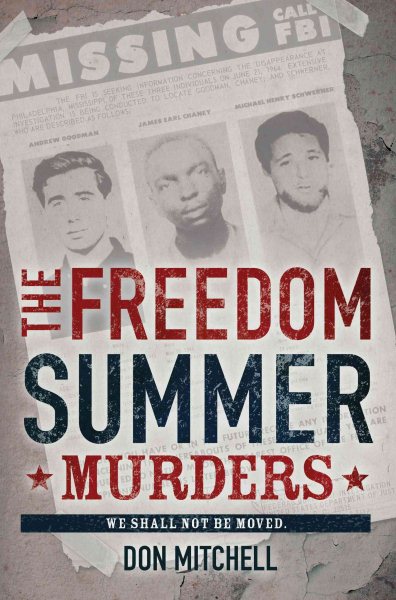
Still, this is an important nonfiction book, one that can easily be read alongside The Road to Memphis by Mildred D. Taylor. As he commemorates the 50th anniversary of the murders of three civil rights workers by the Ku Klux Klan, Mitchell provides a look into one of the dark corners of U.S. history, a time when white racists fought ferociously to maintain their supremacy and when Mississippi inspired terror for America’s black population. The risks of being black in Mississippi were many: mistrust, resentment, jeering, harassment, brutality, and even death.m Summer Murders by Don Mitchell was a difficult book to read. I am always flummoxed by hate, preferring instead to stand up for social justice, to act as Anna Sewell said in Black Beauty all those years ago: “With cruelty and oppression, it is everybody’s business to interfere when they see it.”
In the summer of 1964, civil rights leaders had determined that a major voter registration effort was a step towards empowering these under-served and marginalized individuals. The initiative became known as the Freedom Summer. Mitchell captures this history and puts a human face on it by writing the story of three young men: James Chaney, Andrew Goodman, and Michael Schwerner, “who placed their faith in nonviolence in the service of civil rights and social justice” (14). These young men decided to stand up for social justice and to act on their beliefs. Other people in Mississippi joined them—black and white and Choctaw Indian—people with the conscience and the courage took enormous risks in the fight for equality. In the words of Dr. Martin Luther King, Jr., these were people who worked to “break the cycle of retaliation and revenge by not hating one’s enemies” (179). These heroes could not look on and do nothing about the evil they observed, so they forged a strong bond and helped transform a community.
Many of these heroes died a martyr’s death, but their legacy lives on in books like Mitchell’s. Other awareness comes from films like Mississippi Burning and Murder in Mississippi and from inspirational websites like How to be a Hero, sponsored by the Andrew Goodman Foundation. The James Early Chaney Foundation is also dedicated to protecting the constitutional rights of all Americans. With civic engagement and by taking action against injustice, hopefully we can prevent future atrocities against our fellow men and women.
- Posted by Donna

